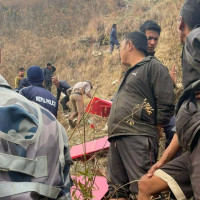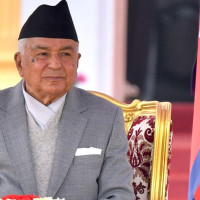- Tuesday, 3 March 2026
Youth Deserve Space In Politics
More and more Nepali youths are showing interest in politics with a drive to reshape the destiny of the country. The vast majority of Nepal's population today belongs to the youth population category at 40.8 per cent of the total population. This demographic reality offers immense opportunities alongside daunting challenges in the country's development. To navigate the situation, it is important for the young people to get involved in politics and have their say in matters that directly affect them, such as education, health, employment and social security.
The need to engage youth in politics is gradually being recognised by political organisations. Political parties have initiated involving young leaders in the decision-making process, although there are still obstacles that stop young people from participating fully in politics, which include a lack of funding or representation in crucial positions. This, however, can be rectified by bringing new energy and ideas to the political arena and leading them towards the nation-building process. This can increase youth involvement and also pave the way for their broader and greater role in Nepal’s advancement.
Showcasing achievements
The role of media can be vital to showcase the achievements of young leaders and allow fair exposure of the youth's role in political activities. Showcasing the gains of youth could be instrumental in altering public attitudes vis-à-vis young people in politics. A one-on-one communication between legislators and youth, establishing an official platform for discussion, dispute resolution, feedback collection, and policy development, could draw them towards politics. The government could also launch projects of paid internships for graduates who aspire to get practical experience in policymaking, which could lead them towards political participation.
The political parties could also be encouraged to allocate budgets to increase youth participation, as has been done in other countries, like India, Australia, Canada, and New Zealand. Nepal's strength lies in its great human resource, where nearly half the population is youths. The county could unleash this potential by giving them a platform to articulate their ideas and by including these voices in practices and creating an atmosphere where young people feel accepted to actively participate in the democratic process. Nepal's political future is expected to be greatly influenced by the involvement of youth.
The country as a whole should come together to unlock the potential of the young Nepalis through leadership development. The emergence of youth leaders is an issue in need of urgent attention to open the door for a change in Nepal’s political landscape. However, the role of old political leadership should also be recognised as they played an important role in offering guidance, experience, and stability during times of political uncertainty. The older leadership's sound understanding of national and international affairs can help to shape long-term policies that go beyond short-term gains. There are proficient leaders in the Nepali political parties who possess vision and insight that balance idealism with practical governance essential for tackling the country's complex challenges.
Such leadership could act as mentors by guiding young leaders, helping them to understand political dynamics and pressure, as well as encouraging ethical governance, which is very valuable in a fragile democracy like Nepal. Another factor that the youths of Nepal should acknowledge is the country's diversity. Nepal's great diversity, which is a challenge as well as an opportunity, can be used as an immense asset for its development. A country that has diversity entrenched in each aspect of its society — religion, culture, geography, ethnicity, and food habits — offers huge potential for unity, creativity, and national pride.
This diversity is a rich resource for young political leaders. To develop and transform this diversity into unity and strength, all Nepali youths must champion inclusive politics and push for equity-based representation. There is no shortcut to Nepal's advancement, but to accept and embrace dialogue, social justice, and collaborative leadership, through which youth can help build a democratic Nepal as envisaged in its constitution.
Conviction
To conclude, the world as a whole has recognised the conviction of Nepali youths who, as migrants, have played a crucial role in the development of many countries in various sectors—construction, manufacturing, hospitality, and domestic work sectors in the Middle East and Southeast Asia. In countries like Australia, the United Kingdom, and the United States of America, Nepali youths are an integral part of research, academia, healthcare, and entrepreneurship by providing essential services in these countries.
Hence, the entry of more young Nepalis into the political sphere could provide new insights and creative answers to persistent problems that have plagued the country's development. Their active participation may lead towards progressive ideas, more inclusive policies, and a governance that could better reflect the aspirations of Nepali youth. This could foster a more responsible and dynamic democracy that is competent to handle the problems of the twenty-first century by acknowledging the ideas and energy of Nepali youths.
(Niroula is a youth leader. nirajsmiles@gmail.com.)
















